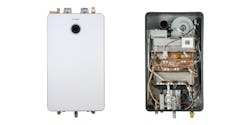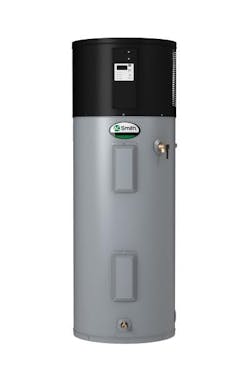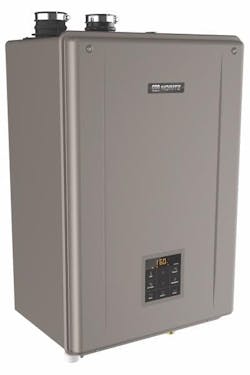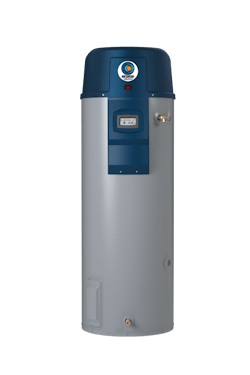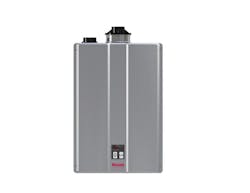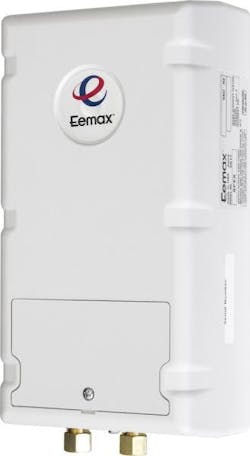Coming in Hot: 6 Water Heaters That Are Warming Up to Tech
We should have figured that cars, bombs, and beer would eventually get us into hot water. Founded in Milwaukee in 1874 as a general machining shop, A.O. Smith developed the first pressed-steel auto frame in the 1920s, enabling assembly-line manufacturers, such as the Ford Motor Co., to catalyze a fledgling auto industry.
A leading munitions maker during the World Wars, A.O. Smith also developed the process of fusing glass to steel, which in the 1930s led to glass-lined kegs and tanks to optimize beer brewing and storage. During the course of making 11,000 such tanks for U.S. breweries, A.O. Smith scaled the insulated vessel down to homeowner size, and in 1936 the residential water heater was born.
Consumer appreciation of innovations in the decades since has been tepid at best, mostly due to a set-it-and-forget-it attitude that relegates water heaters to basements and garages until a critical failure brings them to homeowners’ attention.
The Voltex hybrid electric heat pump water heater is available in 50-, 66-, and 80-gallon models. The user-friendly display is simple to use and has four operating modes: Efficiency; Hybrid; Electric; and Vacation, which can maintain a 60° F tank temperature for energy efficiency and freeze protection.
“A water heater replacement is largely an emergency replacement,” says A.O. Smith vice president of marketing David Chisolm. “You don’t think about it for 365 days a year, but once you get a cold shower, it becomes the No. 1 thing on your list. It’s an unplanned exercise and an unplanned expense. That’s a problem. Homeowners don’t wake up ready to spend $1,000. They just want to get back into hot water as cheaply and quickly as possible.”
Even with the advent of residential tankless heaters in the 1980s and ’90s, purchasing decisions were guided by an either/or dichotomy largely dictated by market geography and what was originally installed by the builder.
But to hear manufacturers tell it, water heaters are finally coming into their own, with a proliferation of features and innovations designed to match homeowner consumption patterns, save big on residential energy costs, and take advantage of installation flexibility. For builders and replacement contractors, homeowner-friendly apps and continued utility rebates could make for even easier value-added upsells into an evolving product category.
The NRCB is available in two models (NRCB180DV and NRCB199DV) that can simultaneously provide space heating and hot water, with maximum flow rates of 9.8 and 11.1 gpm, respectively. Each unit weighs less than 100 pounds, will self-adjust to PP or CPVC venting, and is Wi-Fi-enabled.
“Taking into consideration the homeowner’s water use, demand, and installation scenario are vital steps in specifying water heating options,” says Andrew Tran, marketing manager for Noritz America, a U.S. subsidiary of the Japanese tankless hot water heater manufacturer.
Indeed, on both the manufacturer and installer fronts, the industry is moving away from jargon-filled marketing and toward more user-friendly messaging to better inform homeowners about technologies involving recirculation, auto-tuning, and Wi-Fi connectivity. Be it gas or electric, tank or tankless, better homeowner education is key to breaking the feedback loop whereby most homeowners simply replace a failed unit with a similar brand and model.
“As an industry, we’ve been guilty of talking in gallons and Btus, but homeowners usually don’t know or don’t know to care about those performance attributes,” Chisolm says. “But they do know how long a shower they take, how many back-to-back showers they take, and how hot a shower they take. That’s because bathrooms don’t use hot water; people do.”
The Premier Power Direct Vent High Efficiency gas water heater (GP6-50-YTPDT) features a 50-gallon tank and 100,000 Btu gas burner to deliver a recovery rate of 129 gallons per hour with 96 percent thermal efficiency. It also has a spiral heat exchanger, side-mounted recirculating taps, and a tamper-resistant brass valve.
To keep customers satisfied, product features such as circulation technologies that keep piped water warm from heater to faucet have evolved to embrace both comfort and conservation. Wi-Fi connectivity also lets homeowners monitor consumption patterns, select operation modes to prevent scalding, and reduce or increase water temperatures.
“Especially with gas tankless, what’s new and hot right now is recirculation,” says Freddie Molina, former product manager for Bosch Heating and Cooling North America. “Right now, there is a wait for the slug of cold water to empty and be dumped into the drain until the hot water arrives,” he says. “Hot water constantly pumped to the fixtures eliminates the waiting game to have hot water instantly, and it’s the fastest growing segment of the tankless market.”
Coupled with Wi-Fi–connected apps for command, control, and consumption reporting, recirculation promises to propel water heaters into the mix with other smart appliances.
The Sensei tankless offers 14 vent configurations, up to a 65-foot vent run with 2-inch PVC, and quick gas conversion. Its combustion system will self-compensate to optimize low-pressure performance, and every component can be removed in less than 10 minutes.
“Connectivity is crucial in the market now,” says David Federico, brand director for Rinnai America, the North American subsidiary of the Japanese gas appliances manufacturer. “The latest version of our Control-R app allows consumers to control their water heater and its recirculation through Amazon Alexa, so homeowners can now say, ‘Alexa, tell Rinnai I’m going to take a shower,’ and the water heater will start circulating hot water to the faucet.”
Connectivity also promises better machine awareness to push fault codes and alerts when service is needed, and apps will help walk homeowners through the product selection process.
“That’s the beauty of digital tools,” Chisolm says. “We can establish the technology on the back end, so instead of being a product expert, contractors can open up an app and act as consultant with happier customers and more specific, customized solutions.”
The LavAdvantage thermostatic tankless hot water heater is designed for point-of-use installation. Ideal for residential bathrooms and kitchen sinks, it offers 0.2 gallon-per-minute (gpm) activation to conserve water and can be mounted in any orientation.
This story originally ran in the September/October 2018 issue of PRODUCTS magazine. See the print version here.
